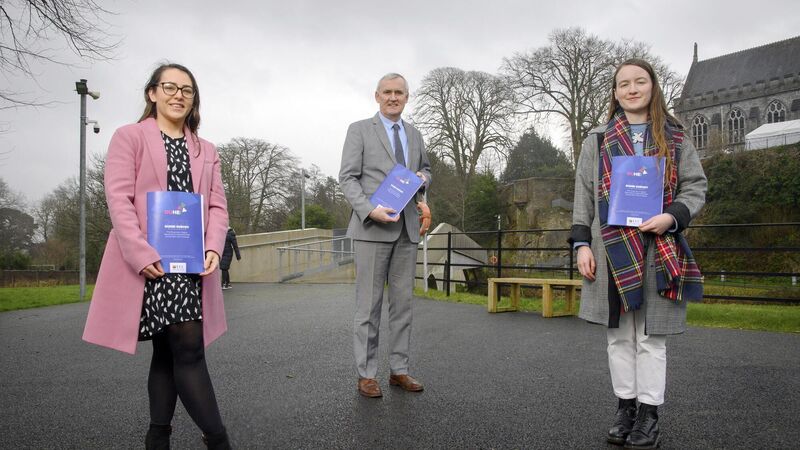UCC research team develops survey determining prevalence and type of drug use among third-level students

Pictured are Sam Dick, Project Manager on the DUHEI project , Dr Michael Byrne, Head of Student Health, UCC & Asha Woodhouse, President of UCC student union with the Drug Use in Higher Education Institutions study. Pic Daragh Mc Sweeney/Provision.
A major national survey developed by My Understanding of Substance-use Experiences (MyUSE) research team in University College Cork (UCC) to determine the prevalence and type of drug use among the third-level student population in Ireland has been published.
The Drug Use in Higher Education Institutions (DUHEI) survey analysed over 11,500 responses from students across 21 higher education institutions to give a national picture of drug use among Irish third-level students so that future policy and practice in the area can be informed.
The survey population included undergraduate and postgraduate students aged 18 years and over and found that over half of students surveyed reported using an illicit drug, with over one-third reporting drug use in the last year, and one-fifth reporting using drugs in the last month.
Over half of students surveyed felt drug use is a normal part of student life, but over half also felt drug use has a somewhat negative or an extremely negative impact on student life.
Of those who had used drugs during Covid-19, one in three students had decreased their use; while just less than one in four had increased their use over this period and one in four male students report current drug use compared with one in six females.
The most commonly used drugs are cannabis (52%); cocaine (25%); ecstasy (23%); ketamine (16%); mushrooms (12%); amphetamines (9%) and New Psychoactive Substances (8%). This order of prevalence of drugs/drug types is maintained across all three user groups.
Dr Michael Byrne, Head of University College Cork (UCC) Student Health and lead of the DUHEI Project team said:
Most students in Higher Education in Ireland do not take drugs regularly, but a significant proportion do.
"If we are to work with our students and our institutions to address this issue, it is vital that we understand the reasons why our students choose to take drugs, or indeed choose not to take drugs; and to base our actions on data and evidence.”
Minister for Further and Higher Education, Research, Innovation and Science Simon Harris said that the report helps understand the prevalence of drug use and the range of drugs being used by students as well as detailing the impacts and effects, including harms caused by drug use in the student population.







 App?
App?


